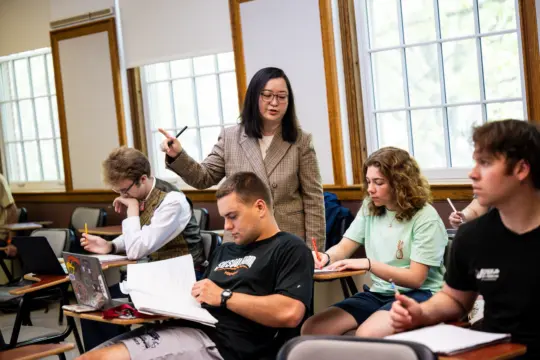Economics
Take the pulse of the world through leading global economic indicators.

Economics Degree
Global gatekeepers, individual decision makers and the wealth of nations
The study of economics is for big-picture people as it takes myriad factors into consideration: natural resources, scarcity and abundance, laws, politics, human behavior, manufacturing, commerce, welfare and wealth. In short, as an economist, you take the pulse of the world to assess how well things are going through leading global economic indicators. If you are that kind of person who thirsts for knowledge, keeps abreast of international markets and revels in understanding complex systems, consider a major in economics at Susquehanna — a recognized leader in economic research.
You have two degree paths. You can earn a Bachelor of Science degree from the Sigmund Weis School of Business, which holds top-notch accreditation from AACSB International that makes your degree stand out. Or, if you want to become an accomplished economic analyst, the broader-based Bachelor of Arts degree offers you wider courses on critical thinking, communication, interpersonal relationships, leadership and collaboration.
For either degree, you will work closely with a faculty mentor on at least one research project that you can present your research on campus, nationally or internationally. As a proud River Hawk, you’ll have the satisfaction of being a part of a department that consistently ranks as one of the top liberal arts economics departments for research by the Federal Reserve, which will give you a leg up above your peers from other colleges and universities.
KICKSTART YOUR CAREER WITH PRESTIGIOUS INTERNSHIPS
Susquehanna University offers students valuable internships, like those at Johnson & Johnson, providing the real-world experience needed to excel in the corporate world.

SUsquehanna By the Numbers
More Than Metrics
70+
percentile in national rankings for research
100%
of economics students can earn Bloomberg Certification in their first year
ECONOMICS OFFERS GROWTH OPPORTUNITIES FOR GROWTH
Susquehanna’s economics majors can put their studies into action with study-abroad and philanthropic excursions, internships at major financial institutions and more. Explore your options to go beyond the economics classroom.

Explore Your Studies
Program Resources
Basic macro- and microeconomics principles. Discusses unemployment, inflation, resource scarcity and consumer and business behavior under various market structures. Not open to students pursuing a major in the Sigmund Weis School of Business or pursuing an economics B.A. major. 4 SH. CC: Social Interactions.
Introduces aggregate economics. Emphasizes current issues such as unemployment, inflation, stagflation, monetary and fiscal policies and international economics. 4 SH. CC: Social Interactions.
Introduces aggregate economics. Emphasizes current issues such as unemployment, inflation, stagflation, monetary and fiscal policies and international economics. 4 SH. CC: Social Interactions.
Introduces principles of supply and demand and how they affect levels of output, price and employment under various market structures. 4 SH. CC: Social Interactions.
Introduces principles of supply and demand and how they affect levels of output, price and employment under various market structures. 4 SH. CC: Social Interactions.
A comprehensive study of the major economic aggregates and the theories of income determination. Includes applications to contemporary public issues, such as achieving full employment, price stability and a desired rate of economic growth. Prerequisites: ECON-105 or ECON-201 and ECON-202. 4 SH.
A comprehensive study of the major economic aggregates and the theories of income determination. Includes applications to contemporary public issues, such as achieving full employment, price stability and a desired rate of economic growth. Prerequisites: ECON-105 or ECON-201 and ECON-202. 4 SH.
Analyzes how consumers, businesses and suppliers of labor and other resources make their choices. Covers how individual markets for products and resources determine resource allocation, wages, prices, income distribution and levels of production. Students may earn credit for only ECON-313 or ECON-315. Prerequisites: Either a calculus course or INFS-233 and either ECON-105, or both ECON-201 and ECON-202. 4 SH.
Analyzes how consumers, businesses and suppliers of labor and other resources make their choices. Covers how individual markets for products and resources determine resource allocation, wages, prices, income distribution and levels of production. Students may earn credit for only ECON-313 or ECON-315. Prerequisites: Either a calculus course or INFS-233 and either ECON-105, or both ECON-201 and ECON-202. 4 SH.
A study of the application of economic theory and methods to business and administrative decision-making processes, emphasizing the role that economic analysis plays in managerial decisions. Quantitative methods and tools – such as simple regression analysis, statistics, time series forecasting models, linear programming, and spreadsheet-packages – are introduced to assist students in gaining better insight into the methods of economic analysis and the applications of managerial economics to real-life decisions. Students may earn credit for only ECON-313 or ECON-315. Prerequisites: ECON-105 or both ECON-201 and ECON-202. 4 SH.
A study of the application of economic theory and methods to business and administrative decision-making processes, emphasizing the role that economic analysis plays in managerial decisions. Quantitative methods and tools – such as simple regression analysis, statistics, time series forecasting models, linear programming and spreadsheet-packages – are introduced to assist students in gaining better insight into the methods of economic analysis and the applications of managerial economics to real-life decisions. Students may earn credit for only ECON-313 or ECON-315. Prerequisites: ECON-105 or both ECON-201 and ECON-202. 4 SH.
Examines the general linear regression model and its use to analyze economic data. Focuses on estimating economic models, verifying economic theories by testing alternative hypotheses, and forecasting the future of economic variables. Prerequisites: ECON-105 or both ECON-201 and ECON-202; MATH-108, MATH-180, MGMT-202, or PSYC-123. 4 SH.
Examines the general linear regression model and its use to analyze economic data. Focuses on estimating economic models, verifying economic theories by testing alternative hypotheses, and forecasting the future of economic variables. Prerequisites: ECON-105 or both ECON-201 and ECON-202; MATH-108, MATH-180, MGMT-202, or PSYC-123. 4 SH.
Theoretical and empirical investigation of the functions and outcomes of labor markets. Discusses and analyzes current labor issues, trends and developments. Emphasizes how public policies, individual market characteristics of employees, firms and organized labor influence human resource allocation and compensation. Prerequisites: ECON-105 or both ECON-201 and ECON-202. 4 SH.
Theoretical and empirical investigation of the functions and outcomes of labor markets. Discusses and analyzes current labor issues, trends and developments. Emphasizes how public policies, individual market characteristics of employees, firms and organized labor influence human resource allocation and compensation. Prerequisites: ECON-105 or both ECON-201 and ECON-202. 4 SH.
Examines contemporary and historical patterns of economic interactions and interdependence among national economies. In-depth analysis of exchange rates, capital flows and trade flows. Discusses problems of international resource transfers in the context of evolving international economic institutions. Prerequisites: ECON-105 or both ECON-201 and ECON-202. 4 SH.
Examines contemporary and historical patterns of economic interactions and interdependence among national economies. In-depth analysis of exchange rates, capital flows and trade flows. Discusses problems of international resource transfers in the context of evolving international economic institutions. Prerequisites: ECON-105 or both ECON-201 and ECON-202. 4 SH.
Examines depository and non-depository financial institutions, financial markets and instruments. The Federal Reserve System’s structure and role in controlling the money supply and regulating financial institutions and markets are discussed in detail. The course examines Keynesian, monetarist and new classical approaches to monetary policy and controversies concerning inflation, unemployment, economic growth, and balance of payments. Prerequisites: ECON-105 or both ECON-201 and ECON-202. 4 SH.
Examines depository and non-depository financial institutions, financial markets and instruments. The Federal Reserve System’s structure and role in controlling the money supply and regulating financial institutions and markets are discussed in detail. The course examines Keynesian, monetarist and new classical approaches to monetary policy and controversies concerning inflation, unemployment, economic growth, and balance of payments. Prerequisites: ECON-105 or both ECON-201 and ECON-202. 4 SH.
Examines the influence of government in a market-oriented economy. Analyzes how tax and spending policies reallocate resources, redistribute income, and affect stable economic growth. Prerequisites: ECON-105 or both ECON-201 and ECON-202. 4 SH.
Examines the influence of government in a market-oriented economy. Analyzes how tax and spending policies reallocate resources, redistribute income, and affect stable economic growth. Prerequisites: ECON-105 or both ECON-201 and ECON-202. 4 SH.
Examines theories of economic growth and development. Includes in-depth discussions of problems of economic development that confront developing nations. Prerequisites: ECON-105 or both ECON-201 and ECON-202. 4 SH.
Examines theories of economic growth and development. Includes in-depth discussions of problems of economic development that confront developing nations. Prerequisites: ECON-105 or both ECON-201 and ECON-202. 4 SH.
Examines issues of political interaction with economic forces at the national, international and global levels. Topics studied include: economic systems, international trade and finance, the European Union, NAFTA, CAFTA, OPEC, multinational corporations, economic development, poverty, inequality and global environmental issues. Same as POLI-338. Prerequisites: sophomore standing, ECON-105 or ECON-201, or intructor’s permission. 4 SH. CC: Interdisciplinary.
Examines issues of political interaction with economic forces at the national, international and global levels. Topics studied include: economic systems, international trade and finance, the European Union, NAFTA, CAFTA, OPEC, multinational corporations, economic development, poverty, inequality and global environmental issues. Same as POLI-338. Prerequisites: sophomore standing, ECON-105 or ECON-201, or intructor’s permission. 4 SH. CC: Interdisciplinary.
Examines theory and practice of economic policy in the contemporary open-economy environment. Includes detailed analysis of fiscal and monetary policies for the interdependent national economies. Emphasizes the relationship between deficit financing and inflation. Prerequisites: ECON-105 or both ECON-201 and ECON-202. 4 SH.
Examines theory and practice of economic policy in the contemporary open-economy environment. Includes detailed analysis of fiscal and monetary policies for the interdependent national economies. Emphasizes the relationship between deficit financing and inflation. Prerequisites: ECON-105 or both ECON-201 and ECON-202. 4 SH.
Survey of key events in world economic history. Examines the main causes and effects of historical events and explores potential lessons for the modern world. Prerequisites: ECON-105, or ECON-201 and ECON-202. 4 SH.
Analyzes the strategic interaction between parties. Normal and extensive form games will be studied, with discussions of dominant and mixed strategies, Nash Equilibrium, and incentive compatibility. This course has applications to economic decision making, industrial organization, bargaining and negotiation, and political science. Prerequisites: An introductory statistics course, ECON-202 or ECON-105, or instructor’s permission. 4 SH.
Study the writings on political and economic issues from several different writers. The readings will be from a diverse set of writers, with views ranging from politically liberal to politically conservative. This course will examine and analyze these writers’ views on social justice, tax policies, discrimination, socialism and much more. Prerequisites: ECON-105, or ECON-201 and ECON-202 or instructor’s permission. 4 SH. CC: Diversity Intensive.
Study of selected topics as needed, based on student and instructor interest. 1 – 4 SH.
Study of selected topics as needed, based on student and instructor interest. 1 – 4 SH.
A survey of the development of economic ideas. Examines the parallel development of economic doctrines and industrial systems from the Middle Ages to the present. Examines implications of these doctrines for current policy issues. Prerequisites: ECON-105 or both ECON-201 and ECON-202. 4 SH.
A survey of the development of economic ideas. Examines the parallel development of economic doctrines and industrial systems from the Middle Ages to the present. Examines implications of these doctrines for current policy issues. Prerequisites: ECON-105 or both ECON-201 and ECON-202. 4 SH.
Examines emerging market economies on both theoretical and practical bases and in historical perspective. Compares market-oriented economies arising from different socio-cultural backgrounds. Prerequisites: ECON-105 or both ECON-201 and ECON-202. 4 SH.
Examines emerging market economies on both theoretical and practical bases and in historical perspective. Compares market-oriented economies arising from different socio-cultural backgrounds. Prerequisites: ECON-105 or both ECON-201 and ECON-202. 4 SH.
Introduces the new and intriguing world of global finance. Explores theoretical and practical reasons for international capital flows. Studies the evolution of financial liberalization on a world scale in conjunction with interest rate and exchange rate dynamics. Practically analyzes the interplay of capital inflows and domestic economic policies using examples of economic collapses of Asia, South America and Eastern Europe. Impacts of European Monetary Union and the co-integrating relationship between the major financial centers conclude the course. Prerequisites: ECON-105 or both ECON-201 and ECON-202. 4 SH.
Introduces the new and intriguing world of global finance. Explores theoretical and practical reasons for international capital flows. Studies the evolution of financial liberalization on a world scale in conjunction with interest rate and exchange rate dynamics. Practically analyzes the interplay of capital inflows and domestic economic policies using examples of economic collapses of Asia, South America and Eastern Europe. Impacts of European Monetary Union and the co-integrating relationship between the major financial centers conclude the course. Prerequisites: ECON-105 or both ECON-201 and ECON-202. 4 SH.
Introduces students to the empirical research methods in economics. Students are expected to use real data in a topic chosen in consultation with the instructor and present their findings. Prerequisites: senior standing, statistics (MGMT-202, MATH-108, MATH-180 or PSYC-123), and ECON-105 or both ECON-201 and ECON-202. 4 SH. Capstone.
A course focusing on varying topics of interest to the students and the instructor. Topics may include public policies toward business, problems of manpower development, the role of population in economic development, development of various regions, or the use of mathematics in economics. Prerequisites: Senior standing, ECON-105 or both ECON-201 and ECON-202, and instructor’s permission. 2-4 SH.
A course focusing on varying topics of interest to the students and the instructor. Topics may include public policies toward business, problems of manpower development, the role of population in economic development, development of various regions, or the use of mathematics in economics. Prerequisites: Senior standing, ECON-105 or both ECON-201 and ECON-202, and instructor’s permission. 2-4 SH.
Individual work on selected topics for qualified students under faculty supervision. Prerequisites: ECON-311 and ECON-313, plus four additional semester hours in economics and department head’s permission. 2-4 SH.
Individual work on selected topics for qualified students under faculty supervision. Prerequisites: ECON-311 and ECON-313, plus four additional semester hours in economics and department head’s permission. 2-4 SH.
A learning experience that cultivates a student’s academic and professional development through valuable work experience and the integration of classroom-acquired knowledge by working at a public accounting firm, corporation, governmental agency, or nonprofit organization. Prerequisites: Approval by the SWSB Internship Coordinator and acceptance by the organization. Graded on an S/U basis. 2 or 4 SH.
A learning experience that cultivates a student’s academic and professional development through valuable work experience and the integration of classroom-acquired knowledge by working at a public accounting firm, corporation, governmental agency, or nonprofit organization. Prerequisites: Approval by the SWSB Internship Coordinator and acceptance by the organization. Graded on an S/U basis. 2 or 4 SH.
When you enroll at Susquehanna, you’ll be paired with an advisor and application tool to guide you in your course planning and scheduling. The following is an excerpt from the complete course catalog. Enrolled students follow the requirements of the course catalog for the academic year in which they declare each major and/or minor, consult with their advisor(s).
Learning Goals
- Demonstrate understanding of the concept of scarcity of resources and the opportunity cost associated with choices made.
- Demonstrate understanding of basic economic models of supply and demand, the role of prices in efficient allocation of resources, and how changes to supply and demand affect the market price and quantity of a particular good or service.
- Demonstrate understanding of how the national economy works, the role of government in the economy, and the reasons for macroeconomic policy proposals.
- Understand interactions in a global economy setting, the basis for exchange and the sources of comparative advantage that drive trade.
- Demonstrate understanding of international trade issues and the impact of appreciations and depreciations of exchange rates on different sectors of the economy.
- Understand economic data and some basic analysis methods.
Degree Programs in Economics
Susquehanna University has two degree programs in economics. The Bachelor of Arts (BA) degree is a liberal arts degree earned through the university’s School of Natural & Social Sciences. Students pursuing a Bachelor of Arts in economics choose an emphasis in financial economics, general economics or mathematical economics. The Bachelor of Science (BS) degree is a more technical degree and is earned in the Sigmund Weis School of Business. It integrates extensive business administration coursework into the study of economics.
Major in Economics
Double-counting Restriction
A student can declare two majors within the Sigmund Weis School of Business, but they may not declare a double major in both Marketing and Luxury Brand Marketing & Management. Students must complete all the requirements for both declared majors. Students may only double-count the courses included in the Business Foundation requirements. Therefore, if a course is used to satisfy a requirement of one major, that same course may not be used to fulfill a requirement of the second major within the School of Business.
Requirements for the Bachelor of Arts Degree — General Emphasis
Majors complete 32 semester hours in economics with a GPA of 2.00 or better. They also complete a required course in statistics and a required course in calculus or quantitative methods. The department recommends two courses in calculus for students planning graduate study in economics. Majors must earn grades of C- or better in all required courses except ECON-201 and ECON-202.
- 4 ECON-201 Principles of Macroeconomics
- 4 ECON-202 Principles of Microeconomics
- 4 ECON-311 Intermediate Macroeconomics
- 4 ECON-313 Intermediate Microeconomics Theory or ECON-315 Managerial Economics
- 4 ECON-499 Econometrics
- 4 One statistics course (MGMT-202, MATH-108, MATH-180 or PSYC-123)
- 4 One course in calculus or quantitative methods
- 12 hours of economics electives selected with faculty adviser guidance. A maximum of 4 semester hours of ECON-503 Internship may be applied to the electives.
Financial Economics Emphasis
The financial economics emphasis is designed to provide both a sound theoretical background in economics and a considerable exposure to finance, all in one package. This degree is especially suitable for students who want to a have a strong liberal arts education combined with several business courses without having to follow the structure of a business program. Students earning their degrees in financial economics will acquire proper skills and connections needed to enter and succeed in rewarding careers. In addition, this degree can facilitate the completion of a minor or a second major.
Requirements for the Bachelor of Arts Degree — Financial Economics Emphasis
Majors are required to complete 48 semester hours, with a GPA of 2.00 or better, as follows:
- 4 ECON-201 Principles of Macroeconomics
- 4 ECON-202 Principles of Microeconomics
- 4 ECON-311 Intermediate Macroeconomics
- 4 ECON-313 Intermediate Microeconomics Theory or ECON-315 Managerial Economics
- 4 ECON-330 International Trade and Finance
- 4 ECON-331 Money, Banking and Financial Markets
- 4 ACCT-200 Financial Accounting
- 4 FINC-340 Corporate Financial Management
- 4 FINC-342 Investment Analysis
- 4 ECON-499 Econometrics
- 4 One statistics course (MGMT-202, MATH-108, MATH-180 or PSYC-123)
- 4 Four hours of electives, chosen with adviser’s guidance from one 300 level and above economics course or POLI-333 Development, Globalization and Society. A maximum 4 semester hours of ECON-503 Internship may be applied to the electives.
No grade less than C- will be accepted in all required courses except ECON-201 and ECON-202. The department recommends students pursuing the financial economics emphasis take MGMT-340 and MGMT-342 in the fall and spring of the junior year, respectively.
Requirements for the Bachelor of Science Degree with a Major in Economics
Candidates for the Bachelor of Science with a major in economics successfully complete the business foundation courses as follows and at least 20 semester hours of economics at the 300-level or above as listed below. No grade below a C- will be accepted toward graduation for foundation courses; upon earning a grade below C- in a foundation course, the student must retake the course the next semester in which it is offered. The course descriptions listed later in the catalog identify prerequisites, and these suggest a certain degree of order in completing the foundation. In addition to the foundation, first-semester Weis School students enroll in MGMT-196 Global Business Perspectives (4 semester hours), which provides an introduction to liberal studies and college life, as well as an overview of business functional areas, career opportunities and the Sigmund Weis School curriculum. This course satisfies the First-Year Seminar requirement of the Central Curriculum.
Business Foundation Courses for Economics (B.S.) Majors
Complete one of the following Introduction to Business classes:
- 4 MGMT-195 Global Business Perspectives
- 2 MGMT-138 Fundamentals of Business
Complete one of the following statistics classes:
- 4 MATH-108 Introduction to Statistics
- 4 MATH-180 Statistical Methods
- 4 MGMT-202 Business Statistics
- 4 PSYC-123 Statistics for the Behavioral Sciences
Required courses:
- 4 ACCT-200 Financial Accounting
- 4 ACCT-210 Legal Environment
- 4 ACCT-230 Managerial Accounting
- 4 ECON-201 Principles of Macroeconomics
- 4 ECON-202 Principles of Microeconomics
- 4 FINC-340 Corporate Financial Management
- 4 INFS-174 Data Collection and Modeling
- 4 INFS-472 Data Insight and Visualization
- 2 MGMT-105 Introduction to Professional Development
- 4 MGMT-240 Principles of Management
- 4 MGMT-400 Business Policy and Strategy
- 4 MKTG-280 Marketing
Complete at least 20 semester hours of economics, as follows:
- 4 ECON-311 Intermediate Macro
- 4 ECON-313 Intermediate Micro or ECON-315 Managerial Economics
- 4 ECON-499 Applied Econometrics
- 8 Semester hours of economics electives at the 300-level or higher
No grade less than C- will be accepted to satisfy major course requirements.
Requirements for the Bachelor of Arts Degree with a Major in Mathematical Economics
The Mathematical Economics major is a combined curriculum that incorporates mathematics, economics and statistics to allow students to develop the intellectual and quantitative skills to study questions at the intersection of these disciplines. The major is intended for students with a strong intellectual interest in both mathematics and economics. Students intending to pursue graduate studies in economics are encouraged to consider either the Mathematical Economics major or a double major in Economics and Mathematics. The Mathematical Economics major meets the classification as a STEM discipline according to the United States Citizenship and Immigration Services (USCIS) so that international students are eligible for a 24-month Optional Practical Training (OPT) extension.
Learning Goals
Majors in Mathematical Economics will:
- Develop a comprehensive understanding of economic principles, including scarcity, opportunity cost, and the fundamental models of supply and demand.
- Demonstrate an understanding of the functioning of the national economy, the government’s role, and macroeconomic policy rationales.
- Acquire a basic understanding of the dynamics of a global economy, including trade fundamentals, comparative advantage, and the effects of exchange rate fluctuations on various economic sectors.
- Demonstrate the ability to apply empirical economic and mathematical methods, including multivariate calculus and linear algebra, to gather, interpret and analyze economic data, and effectively communicate their results.
Required courses for Mathematical Economics Major
Economics Core
- 4 ECON-201 Principles of Macroeconomics
- 4 ECON-202 Principles of Microeconomics
- 4 ECON-311 Intermediate Macroeconomics
- 4 ECON-313 Intermediate Microeconomics
- 4 ECON-499 Econometrics (Capstone)
Mathematics Core
- 4 MATH-111 Calculus I
- 4 MATH-112 Calculus II
- 4 MATH-201 Linear Algebra
- 4 MATH-211 Multivariate Calculus
- 4 CSCI-181 Principles of Computer Science
Economics Electives
- 8 300- or 400-level ECON classes
Mathematics Electives: choose 2
- 4 MATH-352 Numerical Analysis
- 4 MATH-353 Differential Equations
- 4 MATH-441 Mathematical Statistics
Statistics Course: choose 1
- 4 MATH-108 Introduction to Statistics
- 4 MATH-180 Statistical Methods
Double-counting restriction
ECON-201 and ECON-202 (or ECON-105), may double-count toward other majors or minors. Two of the three upper-level courses required for the minor may also be double-counted toward other majors or minors.
When you enroll at Susquehanna, you’ll be paired with an advisor and application tool to guide you in your course planning and scheduling. The following is an excerpt from the complete course catalog. Enrolled students follow the requirements of the course catalog for the academic year in which they declare each major and/or minor and consult with their advisor(s).
Minor in Economics
The economics minor completes ECON-201 and ECON-202 (or ECON-105 and another four- semester-hour economics course) and 12 additional semester hours in economics including either ECON-311 or ECON-313 (ECON-315 can substitute for ECON-313), or both, selected in consultation with the minor advisor. Students must complete courses applied to the minor with grades of C- or better.
Double-counting restriction
ECON-201 and ECON-202 (or ECON-105), may double-count toward other majors or minors. Two of the three upper-level courses required for the minor may also be double-counted toward other majors or minors.
- Financial analyst
- Actuary
- Economic consultant
- Lawyer
- Market research analyst
Where Passion Meets Purpose
Straight from the Nest

“One of the organizations I’m a part of is economics club, and I serve as the president. That really makes my time here at Susquehanna feel special, because it allows me to be a part of something I’m passionate about. Because I’m the president, I really get to shape what our club does in the community.”
— Katie Yoder ’27
Recent Employers
Beyond Susquehanna
Meet the Faculty
TAKE A VIRTUAL TOUR
Launch Apfelbaum Hall – Business & CommunicationsYOU MAY ALSO BE INTERESTED IN
See the full list of related programs on the Sigmund Weis School of Business page.
Have Questions?
Contact Us
Start your journey.















